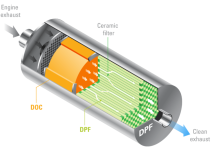There are lots of viewpoints when it comes to synthetic vs. conventional motor oil, or a combo of the two (e.g., synthetic blend). When it comes to viscosity (resistance to flow), however, there are engineering considerations that are hard to ignore.
For example, synthetic’s base—what the oil is made from—already has multi-grade characteristics designed to alter its viscosity at and between two specific operating temperatures standardized by the Society of Automotive Engineers (SAE): 104°F, the “W” for “Winter” in the rating, and 212°F, the second number in the rating. Conventional motor oil, on the other hand, requires additional additives to maintain its viscosity over time because the additives added to its base to make it a multi-grade oil break down faster than synthetic’s base.
The end result is that synthetic oil will maintain its viscosity longer than conventional oil in between oil change cycles, thereby offering more engine protection over time. It doesn’t mean you should run synthetic oil longer, as other additives are likely to breakdown. So follow your vehicle’s recommendations regarding oil change intervals.
Here’s a brief video from a great YouTube channel, Engineering Explained, that looks at both the chemical composition of synthetic vs. conventional motor oils, and how viscosity plays into the equation.
Oh, and please support EE by subscribing to their channel!








I always prefer the extra protection of the synthetic blend oil as it really makes a difference in prolonging the life of the engine.